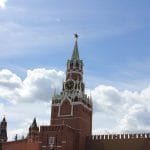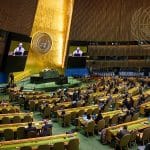While EU Enlargement was supposed to be the primary focus in the region for the final months of 2020, a long-simmering controversy with Bulgaria over the true identity and heritage of North Macedonia’s citizens has moved to center stage, mobilizing political leaders and providing urgent work for hundreds of journalists and dozens of NGOs in Southeastern Europe.
EU Enlargement talks hit a snag
The Bulgarian Foreign Ministry announced on November 6 that it had informed the European Commission that it was unable to accept the currently proposed document entitled the “negotiating framework for the Republic of North Macedonia” and the draft declaration to it, as it does not provide the necessary guarantees for the fulfilment of the conditions Bulgaria seeks.
Shortly thereafter, North Macedonian Prime Minister Zoran Zaev accused Bulgaria of violating Article 2 of the Neighbourhood Agreement, according to which he asserted Bulgaria must support the European path of the Republic of North Macedonia.
Over the past two weeks, the countries have been in talks to try and find a solution before a meeting involving EU foreign ministers, which was planned for November 10 but has now been pushed back to November 17.
Berlin Process Summit
The conflict should have been resolved by November 9-10 when Sofia hosted a Berlin Process Summit meeting (partially via teleconference) co-chaired by Bulgaria and North Macedonia. At that point, Sofia should have decided whether to allow Skopje to launch EU accession talks without the changes it demands in the terms of reference.
In a declaration, the summit participants (all countries of the region) set the goal of establishing a common regional market in the Western Balkans based on EU rules. They also agreed to develop a green agenda to unlock the renewable energy potential of the region modeled on the EU’s Green Pact.
Bulgarian Prime Minister Boyko Borisov and his North Macedonia counterpart Zoran Zaev met in person in Sofia to patch together a solution to their disputes before the November 17 meeting. Neither side made public comments on the dispute, and a draft of a possible compromise between the countries has been leaked to the local media which would obliquely meet the Bulgarian requirement that the changes it demands are formally added to the negotiating documents.
Long-simmering issue
Bulgaria and North Macedonia are at odds over language, and, in turn, history, with Sofia demanding Skopje recognize that its language and country has Bulgarian roots, which would thus put an end to longstanding claims over a distinct Macedonian minority in Bulgaria, possibly up to 10% of the population.
Sofia asserts the language now recognized as Macedonian is a regional dialect of Bulgarian, but North Macedonia maintains for political reasons that Macedonian is a distinct South Slavic language and an integral part of the culture and identity of its citizens.
Sofia is now pressing for the language to be presented in future EU documents as “the official language of the Republic of North Macedonia” and not Macedonian. They also want the entire history in the country’s textbooks related to Macedonia and the Macedonian people before the end of the Second World War in 1944 to be presented as Bulgarian and to whitewash all references to Bulgarian actions in the war as an ally of Nazi Germany.
Sofia has long claimed that the idea of a Macedonian nation and language were engineered in the former Yugoslavia in the late 1940s and that prior to the 1920s most people in the region considered themselves Bulgarians, which aligns the Bulgarians on some points with neighboring Greece.
Bulgarian pressure on North Macedonia comes during a period when Bulgaria has been rocked by the biggest political crisis since 2013 as from the beginning of July 2020 hundreds of thousands of people have been protesting, demanding the resignations of the government and its chief prosecutor.
Earlier last month, the European Parliament criticized Bulgaria due to the serious deterioration of democracy, rule of law and fundamental rights. Parliamentary elections are due in early 2021 and a number of analysts view the dispute with North Macedonia as pre-election gambit by right-wing politicians making any retreat difficult.
These are not simple questions. Athens managed to resolve such matters such as the name and even the language with the signing of the hotly-contested Prespes Agreement in June 2018 with Skopje, and enduring the volatile January 2019 domestic Greek ratification procedure for the treaty, which effectively destroyed the then-ruling leftist-nationalist coalition government and replaced it with a single-party government that ruled ineffectively until the voters decisively rejected it in July 2019, but leaving the agreements with Skopje in place.
Questions need to be asked
One does have to ask whether a country such as North Macedonia that has so many fundamental disputes with various neighbors over language and identity concerns could theoretically resolve its problems by possibly acknowledging that much of that structure was indeed some form of political construct, something progressive intellectuals in North Macedonia have privately acknowledged but politicians cannot.
Nation-building normally requires some type of intellectual underpinning and working to get that subject understood on a sound footing that does not threaten neighbors makes perfect sense. It is hard work and not always successful; just ask the Israelis, Turks, Kosovars, Chechens, Ukrainians, Armenians, or Moldovans.
Washington’s take on this issue impacting one of its key Balkan client states remains important but not pivotal, as leaders all around the world witness the spectacle of massive post-election disarray in Washington. Accordingly, it is unlikely any interventionist comments issued by remaining middle-level State Department staffers under the name of outgoing Secretary of State Mike Pompeo will have a measurable impact.
Bulgaria and North Macedonia continue tussle over language
Both countries strongly dispute language and national identity; EU Enlargement timeline endangered
- Advertisement -
- Advertisement -







